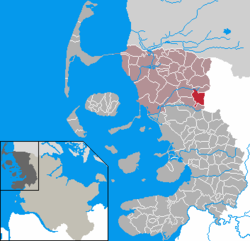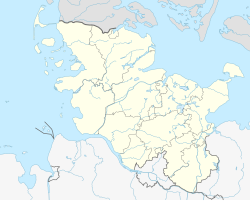
Schleswig-Holstein is the northernmost of the 16 states of Germany, comprising most of the historical duchy of Holstein and the southern part of the former Duchy of Schleswig. Its capital city is Kiel; other notable cities are Lübeck and Flensburg.

The Duchy of Schleswig was a duchy in Southern Jutland covering the area between about 60 km north and 70 km (45 mi) south of the current border between Germany and Denmark. The territory has been divided between the two countries since 1920, with Northern Schleswig in Denmark and Southern Schleswig in Germany. The region is also called Sleswick in English.

Ralph Christian Möbius, known professionally as Rio Reiser, was a German musician and the singer of rock group Ton Steine Scherben. He supported squatting in the early 1970s and later the green political party Die Grünen. After the German reunification, he joined the Party of Democratic Socialism.

Ton Steine Scherben was one of the first and most influential German language rock bands of the 1970s and early 1980s. Well known for the highly political and emotional lyrics of vocalist Rio Reiser, they became a musical mouthpiece of new left movements, such as the squatting movement, during that time in Germany and their hometown of West Berlin in particular. Today, after the band's demise in 1985, and the death of Rio Reiser in 1996, Ton Steine Scherben have retained a cult following and popularity in the related scenes. Recently, some of the remaining members have given reunion concerts.

The House of Glücksburg, shortened from House of Schleswig-Holstein-Sonderburg-Glücksburg, is a collateral branch of the German House of Oldenburg, members of which have reigned at various times in Denmark, Norway, Greece, and several northern German states.

The First Schleswig War or Three Years' War was the first round of military conflict in southern Denmark and northern Germany rooted in the Schleswig-Holstein Question, contesting the issue of who should control the Duchies of Schleswig and Holstein. The war, which lasted from 1848 to 1851, also involved troops from Prussia and Sweden. Ultimately, under international pressure, the Prussians had to withdraw their forces. As a result, the war ended in a Danish victory over the rebels and the signing of the London Protocol in 1852. A second conflict, the Second Schleswig War, erupted in 1864.
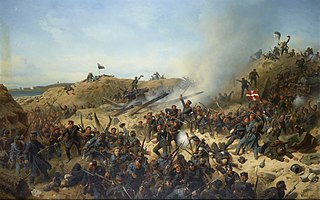
The Second Schleswig War also sometimes known as the Dano-Prussian War or Prusso-Danish War was the second military conflict over the Schleswig-Holstein Question of the nineteenth century. The war began on 1 February 1864, when Prussian and Austrian forces crossed the border into Schleswig. Denmark fought the Kingdom of Prussia and the Austrian Empire. Like the First Schleswig War (1848–1852), it was fought for control of the duchies of Schleswig, Holstein and Lauenburg, due to the succession disputes concerning them when the Danish king died without an heir acceptable to the German Confederation. The war started after the passing of the November Constitution of 1863, which integrated the Duchy of Schleswig into the Danish kingdom in violation of the London Protocol.

SMS Schleswig-Holstein was the last of the five Deutschland-class battleships built by the German Kaiserliche Marine. The ship, named for the province of Schleswig-Holstein, was laid down in the Germaniawerft dockyard in Kiel in August 1905 and commissioned into the fleet nearly three years later. The ships of her class were already outdated by the time they entered service, being inferior in size, armor, firepower and speed to the new generation of dreadnought battleships.

Peter Harry Carstensen is a German politician, in the Christian Democratic Union (CDU) party.

Karrharde was an amt in the district of Nordfriesland, in Schleswig-Holstein, Germany. It was situated on the border with Denmark, approx. 35 km north of Husum, and 25 km west of Flensburg. Its seat was in Leck, itself not part of the amt. In January 2008, it was merged with the Ämter Bökingharde, Süderlügum and Wiedingharde, and the municipalities Niebüll and Leck to form the Amt Südtondern.

The Duchy of Holstein was the northernmost state of the Holy Roman Empire, located in the present German state of Schleswig-Holstein. It originated when King Christian I of Denmark had his County of Holstein-Rendsburg elevated to a duchy by Emperor Frederick III in 1474. Members of the Danish House of Oldenburg ruled Holstein – jointly with the Duchy of Schleswig – for its entire existence.

Südtondern is an Amt in the district of Nordfriesland, in Schleswig-Holstein, Germany.
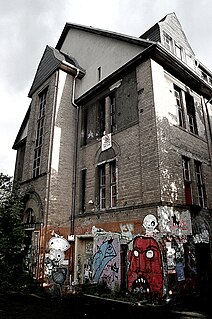
The Rauch-Haus-Song is a track performed by West Berlin band Ton Steine Scherben on their second studio album Keine Macht für Niemand. It has become famous in leftwing circles in Germany.

Flugabwehrraketengeschwader 1 or "Schleswig-Holstein" is a unit of the German Air Force based in Stadum and Husum, Northern Germany. The wing is equipped with the Patriot air defense missile system.

The Evangelical Lutheran Church in Northern Germany is a Lutheran member church of the Evangelical Church in Germany. It was established on 27 May 2012 as a merger of the North Elbian Evangelical Lutheran Church, the Evangelical Lutheran Church of Mecklenburg, and the Pomeranian Evangelical Church. It covers the combined area of all those former member churches, which are the federal states of Schleswig-Holstein, Hamburg and Mecklenburg-Vorpommern. Nordkirche is the only Landeskirche in Germany which covers parts of both New states of Germany and West Germany. It is also called Nordkirche. It has 1,939,750 members (31/12/2019). There are 1,704 ordained pastors and more than 84,000 volunteers working for Nordkirche (4/2016).

Wolfgang Kubicki is a German politician of the Free Democratic Party of Germany (FDP). He has been vice chairman of the FDP in Germany since December 2013. Since 24 October 2017 he has served as Vice President of the Bundestag. From 1992 to 1993 and from 1996 to 2017 he served as chairman of the FDP-group in the Schleswig-Holstein state parliament.

Simone Lange is a German politician of the Social Democratic Party (SPD) who has served as elected mayor of Flensburg since 2017.
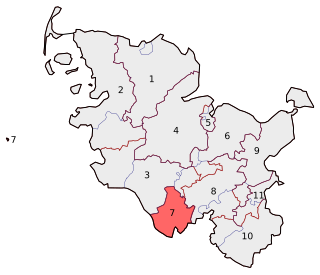
Pinneberg is an electoral constituency represented in the Bundestag. It elects one member via first-past-the-post voting. Under the current constituency numbering system, it is designated as constituency 7. It is located in southwestern Schleswig-Holstein, coterminous with the Pinneberg district.

Björn Bürger is a German operatic baritone.



